This month we bring you news from Venezuela, Colombia, Brazil, Argentina, Chile, an Urgent Action on Ecuador and summaries of Amnesty’s annual reports on all the countries that we cover. Highlights are:
- Colombia – A short Amnesty film showing the devastating impact of a “less than lethal” weapon on Leidy Cadena in the April 2021 National Strike in Colombia. Please write to President Petro and Defence Minister Velásquez demanding police reform now.
- Colombia – A call by the San José de Apartadó Peace Community for support from the international community. Please write to President Petro demanding protection for them
- Venezuela – An Amnesty public statement on the relentless persecution of civil society and dissidents – translation attached, please share.
- Ecuador – An Urgent Action calling for access to food and medication to be restored to detainees in five prisons.
- Brazil – An Amnesty report to the UN raising concerns of gender-based violence against Black women and other women of African descent.
- Chile – An update on efforts to secure justice for those killed and maimed during the 2019 protests, including Gustavo Gatica
- Argentina – protests against proposed budget cuts to public education
COLOMBIA
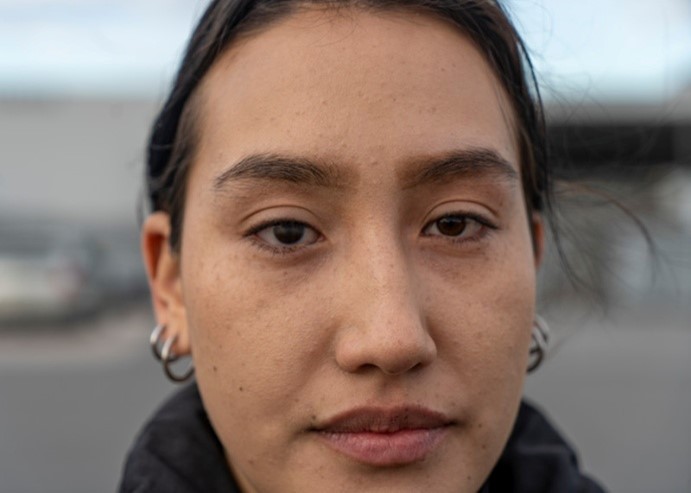
Amnesty has published its Annual Report on Colombia detailing human rights abuses. These include huge numbers of people being forcibly displaced, the high risk of indigenous, Afro-descendant and peasant communities, femicide, violence against LGBTI people, attacks against human rights defenders and lack of protection for Venezuelan refugees. The government failed to implement comprehensive police reform. Progress was made on the use of force during demonstrations, measures to protect human rights defenders and on investigating war crimes
Amnesty issues a short film showing the devastating impact of a less than lethal weapon on Leidy Cadena in the April 2021 National Strike in Colombia. Please write to President Petro and Defence Minister Velásquez demanding police reform now. During the National Strike, at least 84 people lost their lives, thousands were arbitrarily detained and more than 100 people sustained eye trauma. Amnesty has denounced torture, gender-based violence, sexual violence and excessive use of force in the context of the 2021 National Strike, attacks on Indigenous peoples and torture of the civilian population.
Colombia is included in Amnesty’s new report on abortion rights in the Americas. “In Colombia, we’ve seen harassment, slander, and insults levelled against those who provide abortions, who are often ostracized at work. We always have to constantly be wary because the threats never stop”, explained Dr. Gil. “For example, they slashed one of my friend’s car tires. They glued shut a different colleague’s padlock so she couldn’t open her locker. When a friend who is a psychiatrist stood up for a patient who was asking to terminate her pregnancy… one of her colleagues hit her with a folder.”
The Peace Community of San José de Apartadó says that a leading paramilitary with the alias Mateo told an audience of civilians, “We know that this community has the habit of murdering its own members, blaming us, and then demanding reparations from the victims,” calling on them to “unite against the peace community.” The meeting was hosted by the Board Chair of Community Action of a neighbouring community. The Peace Community calls on support from the international community. Please write to President Petro demanding protection for them, sending copies to Roy Barreras, Colombian Ambassador 3 Hans Crescent, London SW1X 0LN elondres@cancilleria.gov.co
The Supreme Court has elected criminal law attorney Luz Adriana Camargo Garzón as the country’s new Attorney General. She is seen as willing to carry through prosecutions that were impeded by her predecessor. She was head of the investigation and litigation department at the UN International Commission against Impunity in Guatemala, and a consultant for the Inter-American Commission on Human Rights in the Office of the Special Rapporteur for Freedom of Expression.
The Guardian reports on how Colombia’s deforestation of the Amazon has surged, following a sharp reduction thanks to President Petro’s peace negotiations with dissident FARC rebels who banned deforestation. However, as peace negotiations flounder, this armed force has returned to allowing deforestation as a bargaining chip with the government.
VENEZUELA
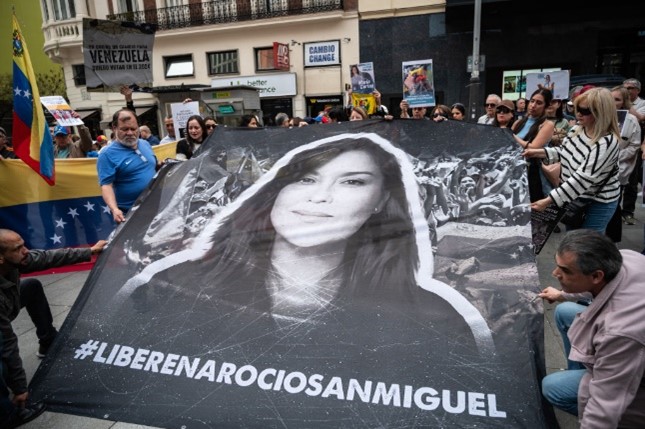
Amnesty has publicised the relentless persecution of civil society and dissidents. Ana Piquer, Americas director, noted that “In Venezuela, Maduro’s government has started the year with an alarming intensification of the policy of repression that it uses to try to curtail civic space, critical voices, and political opposition… these are not new or isolated events. They’re part of a state policy against anyone who might be considered a threat to the current government’s continued grip on power”. We strongly encourage everyone to share Amnesty’s recent public statement (in Spanish), outlining the alarming escalation of persecution in the country.
Amnesty’s 2023 report on Venezuela notes the continued repression of dissent, the lack of access to education, health, food, and water, the use of arbitrary detention and unfair trials, extrajudicial executions and inhuman detention conditions. Also important to note is the continued violence against women and girls, the repression of indigenous rights in the Orinoco Mining area and the refusal of the Maduro government to sign the Escazu Agreement, which guarantees peoples’ rights to participate in decisions impacting the environment.
The non-governmental organisation, Centro para los Defensores y la Justicia (CDJ), has registered 418 attacks and threats to security against human rights defenders in the first four months of 2024. The CDJ has called on the Venezuelan state to protect, guarantee and respect human rights in the country. Independent experts, cited in a report produced by the UN, have also pointed to an increase in the number of forced disappearances occurring in Venezuela, the majority of which have been of people linked to opposition parties. The increase is especially concerning given that the Venezuelan Presidential Election has now been set for the end of July.
Venezuelan President, Nicolas Maduro, has reopened the UN Office for Human Rights, after he expelled them in February 2024. Maduro made the announcement in the company of Karim Khan, Prosecutor at the International Criminal Court. The UN delegation was originally expelled after the UN expressed concerns around the detention of Rocio San Miguel, a lawyer who specialised in abuses of power by the military, who was accused of terrorism without evidence for alleged links with a plan to assassinate Maduro.
ECUADOR
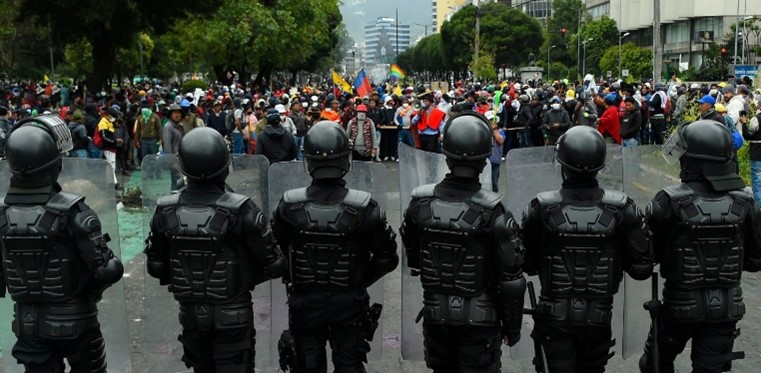 Amnesty has reported that detainees in at least five of the major prisons in Ecuador are at imminent risk of facing hunger and health issues, as prison authorities have halted the provision of food and medication since 24 April. It is calling on the National Service for Integral Attention of People Deprived of Liberty (SNAI) to restore access to food and medication immediately and to guarantee the rights to health, food, and physical integrity of all detainees in Ecuador. There is an Urgent Action here.
Amnesty has reported that detainees in at least five of the major prisons in Ecuador are at imminent risk of facing hunger and health issues, as prison authorities have halted the provision of food and medication since 24 April. It is calling on the National Service for Integral Attention of People Deprived of Liberty (SNAI) to restore access to food and medication immediately and to guarantee the rights to health, food, and physical integrity of all detainees in Ecuador. There is an Urgent Action here.
Amnesty’s 2023 report on Ecuador highlights the expansion of the powers of the armed forces as they were deployed in public security tasks. It also notes the increase in violence in the lead-up to the general elections; continued failure to punish human rights violations; the continued violation of Indigenous Peoples’ rights; the persistence of gas flaring during oil extraction; the failure to protect human rights defenders; poverty and inequality affecting much of the population; and the continued prevalence of gender-based violence.
BRAZIL
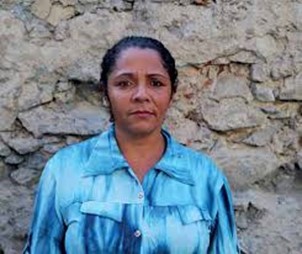
Amnesty’s Annual Report on Brazil notes that Brazil has one of the highest levels of inequality in the world. Systemic racism persisted affecting the Black population’s social, economic, cultural, political, and civil rights. One third of the population remained below the poverty line. Police violence resulted in unlawful killings and other serious rights violations; impunity prevailed. Human rights defenders and activists remained at significant risk. Indigenous Peoples were denied the full enjoyment of their rights. Abortion remained illegal, putting pregnant women at risk.
Amnesty has submitted its Brazilian report to the UN Committee on the Elimination of Discrimination on Women. This submission raises concerns of gender-based violence against Black women and other women of African descent, the impact of the “war on drugs” on black women’s lives and motherhood, and their sexual and reproductive rights. Groups of women, mostly black, who have lost their children to police violence are constantly threatened. Abortion is unlawful unless the result of rape and 483 women died from unsafe abortions in public hospitals from 2012 to 2022.
The UN’s International Independent Expert Mechanism to Advance Racial Justice in the Context of Law Enforcement states Brazil must end the brutal violence being inflicted on people of African descent by the country’s police forces, and hold perpetrators accountable for their crimes while ensuring justice for victims. According to Statista, 6,133 civilians were killed by Brazil’s police in 2023, the vast majority Black.
The UN Committee Against Torture urged Brazil to take urgent measures to demilitarise law enforcement activities, end the use of excessive force, especially lethal force, by law enforcement and military officials, and strengthen its independent oversight mechanisms. The Committee expressed alarm at the lack of effective measures to address the root causes of the extra-ordinary high incarceration rates of Afro-Brazilians, including overpolicing, racial profiling, systemic racial discrimination within law enforcement and other judicial agencies.
The Guardian reports that Brazil has issued its first-ever apology for the torture and persecution of Indigenous people during the military dictatorship, including the incarceration of victims in an infamous detention centre known as an “Indigenous concentration camp”. The apology was made on Tuesday by an amnesty commission attached to the human rights ministry that is tasked with investigating the crimes of the 1964-85 regime.
CHILE
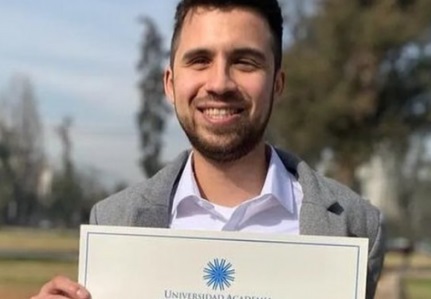
Gustavo Gatica is also featured in the campaign to regulate policing equipment. Gustavo was blinded whilst taking part in the peaceful protests of 2019. Charges have been brought against a specific Carabineros officer, Claudio Crespo (previously referred to by his identification number “G3”) and a trial date is expected imminently. Amnesty are currently focusing efforts on command responsibility on a separate criminal investigation, but one which can also provide justice to Gustavo and hundreds of other victims.
Meanwhile Claudio Crespo has just launched a book – G3: Honor and Betrayal: Revelations of a police officer betrayed by the State. Dismissed from the Carabineros, no longer on remand in prison, he is high profile on television and platforms such as X. He has founded and presides over a political party, Alternative for Chile. Crespo has previously been accused of using excessive force, including shooting indiscriminately and blinding someone during protests in 2018. He admits to shooting his shotgun “at least 170 times” on the day Gustavo was blinded.
The president of the Group of Relatives of Politically Executed Persons (AFEP), Alicia Lira, has complained at the slowness of implementing of the search for missing detainees. The National Search Plan for victims of forced disappearance during the military regime was made official by President Boric last August. She also complains at the lack of financial support from the state to maintain Sites of Memory. Alicia’s husband, Felipe Rivera, was arrested and disappeared during the military dictatorship.
ARGENTINA
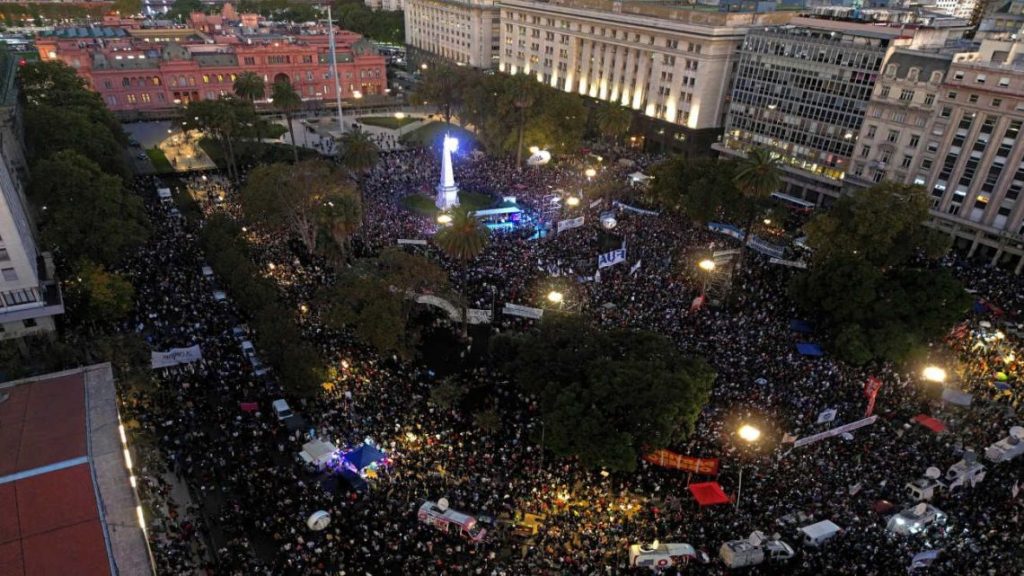
Hundreds of thousands of students, graduates, teachers and workers flooded the streets of Argentina in a historic display of unity against proposed budget cuts to public education. The demonstrations, which took place in over twenty cities across the country, marked one of the largest protests in the last 20 years. They voiced their opposition to the 70% budget reduction proposed by President Javier Milei, which threatens the stability and accessibility of higher education in the country, which is currently free.
Human rights groups have accused President Javier Milei’s government of “dismantling” an investigative unit that probes the archives of the Armed Forces to assist prosecutions investigating crimes against humanity. The research unit carries out crucial work, accessing information to provide evidence about human rights violations and identify the perpetrators. Last month Milei questioned the estimates from human rights groups as to the number of disappeared and proposing that the military assist internal security operations in the country.
A new government resolution broadening the scope for security agents’ use of firearms in Argentina runs counter to basic human rights standards and opens the door to abuse. Human Rights Watch says there are loopholes and ambiguities that could allow security officers to employ firearms in an unacceptably broad set of circumstances. The vague language is inconsistent with human rights standards that limit the use of firearms. It applies to all national security forces, including the national police and the national penitentiary service.
PERU
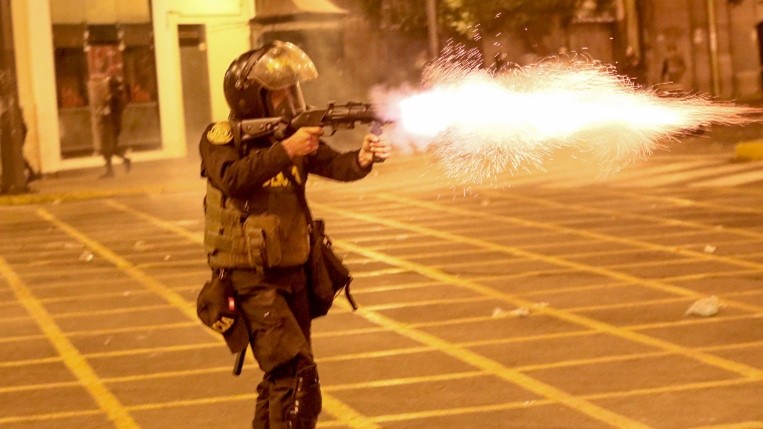 Amnesty’s 2023 report on Peru highlights the excessive use of force used by security forces in response to protests, especially in regions with largely indigenous populations. Among other concerns, it notes the lack of reparations for the La Pampilla refinery oil spill; the significant risk still faced by human rights defenders; the prevalence of sexual and gender-based violence; obstruction of the right to abortion in cases of child pregnancy; the undermining of gender equality; violence and discriminatory legislation still faced by LGBTI people; and denial of due protection to Venezuelans.
Amnesty’s 2023 report on Peru highlights the excessive use of force used by security forces in response to protests, especially in regions with largely indigenous populations. Among other concerns, it notes the lack of reparations for the La Pampilla refinery oil spill; the significant risk still faced by human rights defenders; the prevalence of sexual and gender-based violence; obstruction of the right to abortion in cases of child pregnancy; the undermining of gender equality; violence and discriminatory legislation still faced by LGBTI people; and denial of due protection to Venezuelans.
BOLIVIA
Amnesty’s 2023 report on Bolivia highlights continued concerns over the judiciary’s lack of independence. It also notes the failure to protect human rights defenders; the failure to provide reparations to victims of huma rights violations; the impact of unregulated mining on Indigenous Peoples; attacks on journalists by security forces during protests; and insufficient action to combat forest fires.
PARAGUAY
Amnesty’s 2023 report on Paraguay highlights the Inter-American Court of Human Rights condemnation of the state’s use of torture. It also notes reports of illegal use of force, arbitrary detentions and criminalisation of social protest after the general elections; forced evictions of Indigenous and peasant communities and their exposure to toxic substances; the rejection by the judiciary of name recognition claims of transgender people; sexual abuse of children and adolescents and forced pregnancy of girls; and violence against women.
URUGUAY
Amnesty’s 2023 report on Uruguay highlights the persistence of threats to the media’s freedom of expression and obstacles to access to public information. Among other things, it notes the record rates of imprisonment resulting in overcrowding and inhumane prison conditions; concerns over deaths in prisons; the lack of substantive progress in investigations into historic forced disappearances (while recognising that some military personnel have been prosecuted for crimes against humanity); the hostile environment for girls and women; and the increase in femicides.
All the best,
South America Team – Richard Crosfield (Colombia and Brazil), David Rogers (Argentina and Chile), James Baird (Venezuela) and Graham Minter (rest of South America). And please don’t forget that you can follow us on our Facebook page and Twitter.